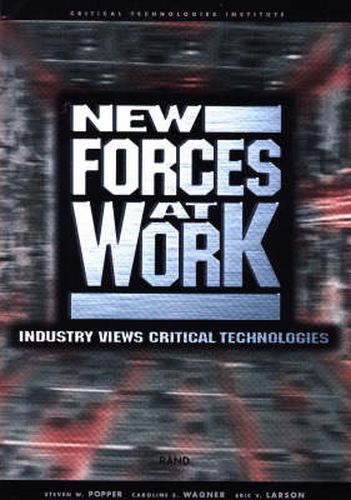Readings Newsletter
Become a Readings Member to make your shopping experience even easier.
Sign in or sign up for free!
You’re not far away from qualifying for FREE standard shipping within Australia
You’ve qualified for FREE standard shipping within Australia
The cart is loading…






As part of the effort to produce the fourth National Critical Technologies Report, the Office of Science and Technology Policy in the Executive Office of the President asked a research team from RAND’s Critical Technologies Institute, now named Science and Technology Policy Institute, to engage business and industry leaders explicitly in a discussion of the issue of critical technologies by gathering private-sector views on what technologies are appropriate to consider under this rubric–and why. The primary substantive input was elicited through extended, detailed interviews conducted individually, usually with one firm’s senior executive per session, on-site in most cases. The report presents and analyzes interviewees’ responses to what technologies they consider to be critical to their firm or industry; explores the question of what critical technology means; reports interviewees’ assessments of the status of U.S. efforts and performance in the areas of technology they deemed critical; considers the respective roles of industry, universities, and government in contributing to and sustaining the U.S. technology base; suggests a process whereby the dialogue between government and industry on the public policy issues relating to technology might be made more integral and informative to the activities of both. The responses of many of the interviewees emphasized the aspect of technology as process over technology as product. In line with this vision, the authors propose a critical-technologies review process that would enable wider, more meaningful, and ongoing communication among industry, government, and universities on technology issues.
$9.00 standard shipping within Australia
FREE standard shipping within Australia for orders over $100.00
Express & International shipping calculated at checkout
As part of the effort to produce the fourth National Critical Technologies Report, the Office of Science and Technology Policy in the Executive Office of the President asked a research team from RAND’s Critical Technologies Institute, now named Science and Technology Policy Institute, to engage business and industry leaders explicitly in a discussion of the issue of critical technologies by gathering private-sector views on what technologies are appropriate to consider under this rubric–and why. The primary substantive input was elicited through extended, detailed interviews conducted individually, usually with one firm’s senior executive per session, on-site in most cases. The report presents and analyzes interviewees’ responses to what technologies they consider to be critical to their firm or industry; explores the question of what critical technology means; reports interviewees’ assessments of the status of U.S. efforts and performance in the areas of technology they deemed critical; considers the respective roles of industry, universities, and government in contributing to and sustaining the U.S. technology base; suggests a process whereby the dialogue between government and industry on the public policy issues relating to technology might be made more integral and informative to the activities of both. The responses of many of the interviewees emphasized the aspect of technology as process over technology as product. In line with this vision, the authors propose a critical-technologies review process that would enable wider, more meaningful, and ongoing communication among industry, government, and universities on technology issues.